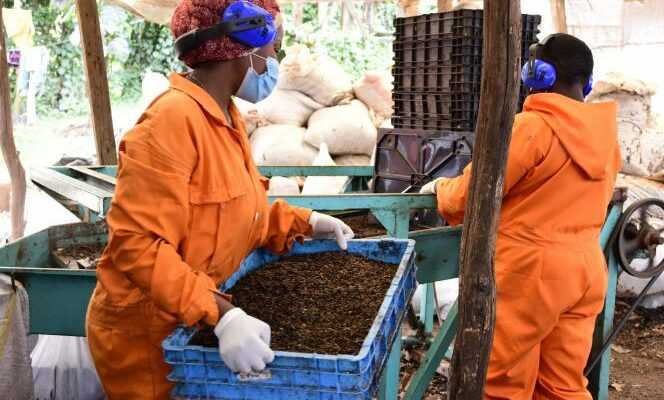To not miss any African news, subscribe to the “Monde Afrique” newsletter from this link. Every Saturday at 6 am, find a week of news and debates treated by the editorial staff of “Monde Afrique”.
Passed the sheet metal door of the building, a deafening song welcomes the visitor. That of the millions of locusts that the Insectipro company produces industrially on a horticultural farm in the suburbs of Nairobi, the capital of Kenya. Tomorrow, some will be sold whole and dried, in the form of seasoned crisps. “Thus, they show the consumer that eating insects is not scary”explains Talash Hujibers, the young founder of Insectipro.
Launched in 2018, the start-up produces 10 kg of locusts every day, but above all a ton of dried black soldier flies reserved for animal feed manufacturers. It participates in the flowering of scientific and commercial initiatives that have been going on for ten years around edible insects in Kenya, where the International Center for Physiology and Ecology of Insects (Icipe) is located.
Grasshoppers, black ants, locusts, flies, termites: between 25 and 50 edible species have been listed in the country, mainly in the western regions where the climate is favorable. Many research programs in Kenya are interested in the potential of these insects and receive funding from a dozen foreign governments, research centers and international institutions such as the Food and Agriculture Organization of the United Nations. agriculture (FAO) or the World Bank.
Objective: to develop new proteins that will feed 8.5 billion people in 2030 on a planet whose natural resources are under severe pressure. The issue is all the more crucial in sub-Saharan Africa where approximately one inhabitant in five today suffers from malnutrition.
Still a lot of reluctance
But insects contain, once dried, between 40% and 75% protein depending on the species, but also fats, vitamins and minerals and more amino acids than plants. and their production “requires less arable land, less water and has a low ecological footprint” says Dr. Chrysantus Mbi Tanga, chief researcher at Icipe.
While entomophagy (the consumption of insects by humans) still arouses much reluctance, the World Bank estimates that between 1 and 2 billion people in the world already feed on insects, mainly taken from the wild. .
On January 19, the institution published a report on insect breeding and hydroponics (above-ground cultivation practiced on a neutral substrate) in Africa which lists the existence of 850 “insect farms” intended to human and animal consumption on the continent. Especially in Kenya where government standards were put in place between 2017 and 2021 to regulate the market, while companies like Insectipro appear every year.
In the East African country, the other major producer is Sanergy. This company of more than 400 employees puts the recycling capacity of black soldier flies at the service of organic waste management. Created in 2011 at the initiative of students from the Massachusetts Institute of Technology (MIT), operational in Nairobi and soon in Kisumu and Kilifi, two other large cities in Kenya, the start-up collects daily human waste from toilets that it settled in the slums.
Beneficial effects for humans
Added to residues from fruit and vegetable markets, waste serves as food for flies, which recycle 70,000 tonnes of it per year. The insects, after sanitary control, end up in animal food; the remains of their digestion become a naturally very rich fertilizer or are transformed into biomass briquettes for combustion.
Meat consumption is on the rise in the country, but comes up against high production costs because of animal feed, which accounts for between 60% and 70% of costs. The proteins intended for breeding come mainly from soybeans, which are imported and therefore subject to customs duties, and from fish.
According to Icipe, 4% of Kenya’s annual animal feed is currently provided by insect protein, but this ratio could reach 40% in two to three years. “According to our observations, the insect-fed chickens grow better and they develop more meat than fat”reveals Dr. John Kinyuru, a food and nutrition researcher at Jomo Kenyatta Agricultural University (Jkuat).
The university’s work has also shown favorable effects for humans. “Eating insects allows the development of micro-organisms and bacteria beneficial to the digestive system. This results in better immunity, reduction of harmful bacteria and therefore better health! »says Dr. Kinyuru.
The Icipe established two years ago that oil from insects was richer in omega-3 fatty acids, antioxidants and vitamin E than vegetable oils. From nutrients necessary for defense against pathogens, prevention of heart disease, to anti-cancer and anti-inflammatory agents. Despite these discoveries, there are still many unknowns about the physiology of insects. Above all, the biggest challenge for this new industry is now to succeed in moving to mass production.
